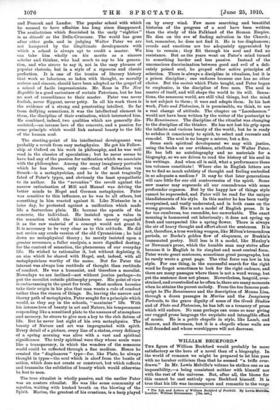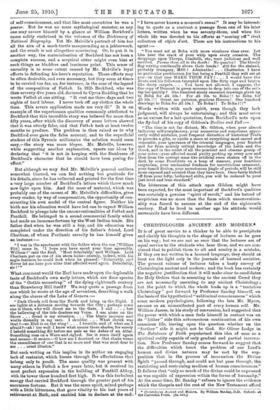WILLIAM BECKFORD.* THE figure of William Beckford would probably be
more satisfactory as the hero of a novel than of a biography. In the world of romance we might be prepared to let him pass with no harsher criticism than that he seemed "a trifle over- drawn." In Mr. Lewis Melville's volume be strikes one as an impossibility,—a being consistent neither with himself nor with the rest of the universe. But, after all, the blame for this cannot be cast entirely upon Beckford himself. It is true that his life was inconsequent and romantic to the verge
• The Life and Letters of William Bedford of Foothill. By Lewis Melville, London: William Heinemann. [15s. net.]
of self-consciousness, and that like most eccentrics he was a poseur. But be was no mere mythological monster, as any one may assure himself by a glance at William Beckford's
name safely enshrined in the volumes of the Dictionary of National Biography. Yet Mr. Melville's portrait of him has all the airs of a mock-turtle masquerading as a jabberwock, and the result is not altogether convincing. Or, to put it in another way, the materialisation of Beckford has not been a
complete success, and a sceptical sitter might even hint at such things as bladders and luminous paint. This sense of unreality is to some extent caused by Mr. Melville's loyal efforts in defending his hero's reputation. These efforts may be often desirable, and even necessary, but they seem at times to be carried too far, as, for instance, in the case of the legend
of the composition of Vathek. In 1835 Beckford, who was then seventy-five years old, declared to Cyrus Redding that he wrote Vat/Lek at one sitting. " It cost me three days and two nights of hard labour. I never took off my clothes the whole
time. This severe application made me very ill." It is an example of the superhuman qualities commonly attributed to Beckford that this incredible story was believed for more than
fifty years, after which the discovery of some letters showed that it was utterly false, and that Vathek took at least twelve months to produce. The problem is then raised as to why
Beckford ever gave the false account, and to the superficial student of this Byronic millionaire the solution would seem
easy,—the story was mere blague. Mr. Melville, however, while suggesting another explanation, _upsets our ideas by declaring that " it is not in keeping with the frankness of
Beckford's character that he should have been posing for effect."
But although we may find Mr. Melville's general outlines somewhat blurred, we can feel nothing but gratitude for his details, since he has collected and printed for the first time a very large number of Beckford's letters which throw much new light upon him. And the mass of material, which was probably one of the causes of Mr. Melville's difficulties, gives every reader, by way of compensation, the opportunity of con-
structing his own model of the central figure. Neither his birth nor his education would have led one to expect William Beckford to plunge into the unconventionalities of Vathek and
Ponthill. He belonged to a sound commercial family which had made an immense fortune by the West Indian trade. His father died when he was still a boy, and his education was
completed under the direction of his father's friend, Lord Chatham, of whose Puritanic severity he has himself given
an instanee
"I was in the apartment with the father when the son [William Pitt] came in. ' I hope you have spent your time agreeably, William ?' said the Earl. Most delectably,' said William. Lord Chatham put on one of his stern looks—sternly, indeed, with his eagle features he could look when he pleased : Delectably, sir? Never let me hear you utter that affected word again. Delectably, eir '"
What comment would the Earl have made upon the deplorable taste of Beckford's own early letters, which are finer species of the " Gothic mousetrap " of the dying eighteenth century than Strawberry Hill itself P We may quote a passage from one which he wrote at the age of seventeen, describing a walk along the shores of the Lake of Geneva :-
" Dark Clouds roll from the North and bring on the Night. I see lights at a distance moving towards the City ; perhaps some one is there, who will direct me to the Gate. I call . . . ; but the bellowing of the tide deadens my Voice. I am alone on the Shore . . . dread is my situation. . . . The blasts increase and wistle dismally in my ears. I shudder. . . . What shriek was that ?—no Bird is on the wing ! . . • I tremble, and of what am I afraid ?—ah ! too well I know what means those shades, for surely I beheld something flit before me pale as the Ashes of an Altar. Something rose on a Wave and sighed. See it rears itself again and moans—it moans.-0 how am I deceived or that shade wears the resemblance of one that is no more and that was most dear to me . . . cruel illusion."
But such writing as this implies in its author an engaging lack of restraint, which bursts through Ile affectations that belong only to youth. The same quality was present with many others in Vathek a few years later, but it received its
most perfect expression in the building of Fonthill Abbey, with its tower three hundred feet high. It was this turbulent energy that carried Beckford through the greater part of his enormous fortune. But it was the same spirit, mixed perhaps
with a little bitterness, that gave vitality to his last years of retirement at Bath, and enabled him to declare at the end: " I have never known a moment's ennui." It may be interest- ing to quote as a contrast a passage from one of his later letters, written when he was seventy-three, and when his whole life was devoted to his efforts at " scoring off " rival collectors of objets d'art. These are his instructions to his agent:— You must set at Bohn with more virulence than ever. Let him hear the crack of your whip upon every occasion. The droppings upon Thorpe, Cimitelli, etc., were judicious and well merited. Pursue them all to the death! No quarter! The bloody flag waving continually above their heads ! £16 for the stained, probably trumpery, MSS. ! Admirable ! . . . Chatterton I have no particular predilection for but being a Foothill they will set at you—in that case MAKE THEM PAY ! • . . I would have the Brute and his followers trampled upon like dirty rugs and beaten like dusty carpets. . . . You have not allowed, I suppose, the fine copy of Dumont in green morocco to drop into one of the set's lap too quickly ? One hundred nicely executed drawings given up to Bohn for £5 10s. ! For £5 10s. to Bohn ! ! to Bohn for' 85 10s. ! ! ! Grant me patience, gracious Heaven ! One hundred drawings to Bohn for .£5 10s. ! To Bohn! To Bohn I l" Words written with such spirit, even though they lack judgment, will always be entertaining ; and this must serve as an excuse for a last quotation, from Beckford's note upon the fly-leaf of his copy of Gibbon's Decline and Fall :—
" The time is not far distant, Mr. Gibbon, when your almost ludicrous self-complacency, your numerous and sometimes appar- ently wilful mistakes, your frequent distortion of historical Truth to provoke a gibe, or excite a sneer at everything most sacred and venerable, your ignorance of the oriental languages, your limited and far from acutely critical knowledge of the Latin and the Greek, and in the midst of all the prurient and obscene gossip of your notes—your affected moral purity perking up every now and then from the corrupt mass like artificial roses shaken off in the dark by some Prostitute on a heap of manure, your heartless scepticism, your unclassical fondness for meretricious ornament, your tumid diction, your monotonous jingle of periods, will be still more exposed and scouted than they have been. Once fairly kicked off from your lofty, bedizened stilts, you will be reduced to your just level and true standard."
The bitterness of this attack upon Gibbon might have been expected, for the most important of Beckford's qualities was certainly a genuine "spirit of revolt," and his hatred of scepticism was no more than the form which unconvention- ality was forced to assume at the end of the eighteenth century. Had he lived in another age his attitude would necessarily have been different.























































 Previous page
Previous page